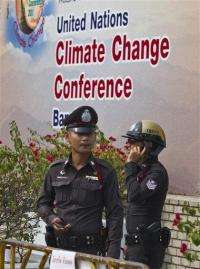World stumbles toward climate summit

(AP) -- Nineteen years after the world started to take climate change seriously, delegates from around the globe spent five days talking about what they will talk about at a year-end conference in South Africa. They agreed to talk about their opposing viewpoints.
Delegates from 173 nations did agree that delays in averting global warming merely fast-forward the risk of plunging the world into "catastrophe." The delegate from Bolivia noted that the international effort, which began with a 1992 U.N. convention, has so far amounted to "throwing water on a forest fire."
But the U.N. meeting in Bangkok, which concluded late Friday after delegates cobbled together a broad agenda for the December summit, failed to narrow the deep divisions between the developing world and the camp of industrialized nations led by the United States. These may come to plague the summit in Durban.
Generally, developing nations, pointing to the industrialized world as the main culprit behind global warning, want an international treaty that would legally bind countries to reduce their greenhouse gas emissions. Washington and others reject it, focusing instead on building on the modest decisions made at last December's summit in Cancun, Mexico.
The Durban agenda calls for discussion on both viewpoints.
"I believe that we now have a solid basis to move forward collectively and that governments can deliver further good results this year, provided every effort is made to compromise," the U.N.'s top climate change official Christiana Figueres said. She expressed regret that the road to Durban is proving a slow one.
Although the Bangkok conference was not geared to tackle the core issues, some movement was at least expected in implementing decisions reached at Cancun. These included the formation of a multibillion-dollar Green Climate Fund to aid developing nations obtain clean-energy technology, setting up a global structure for these nations to obtain patented technology for clean energy and climate adaptation and rounding out a plan to compensate poorer nations for protecting their climate-friendly forests.
Some deadlines for accomplishing these have already passed and it appears little of substance was accomplished in Bangkok, with that work being passed on to the next meeting set for June in Bonn, Germany.
Although also not a pledging session, there was no indication that nations were prepared, in U.N. parlance, to "raise their ambitions," or reduce emissions of greenhouse gases above earlier pledges.
The current total pledges are deemed by the United Nations to fall way short of cuts required to keep temperatures rising more than 2 degrees Celsius (3.8 F) above preindustrial levels - an agreement reached in Cancun by 193 countries.
"We have regrettably spent the entire week negotiating the agenda," said Dessima Williams from the Caribbean island of Grenada. "This is unacceptable, and especially so for small islands who are running out of time if we are to avoid damage from rising sea levels and other climate change impacts. We cannot go on negotiating forever."
But that's what seems in the cards.
Developing countries are keen to preserve the landmark 1997 Kyoto Protocol, the only international existing agreement on reducing emissions. It is expiring at the end of 2012 and some countries, including Russia and Japan, have signaled that they would not make further pledges under an extended protocol.
The European Union is undecided and the United States, which rejected Kyoto, favors each country setting its own targets for emissions but has not ruled out an international pact if all major economies, including China, now the world's no. 1 emitter, are parties.
"We are not prepared to go forward with the binding obligation for ourselves which would not apply to the other major economies," chief U.S. delegate Jonathan Pershing told a news conference.
Environmental activists at the conference mostly backed the developing world position, and, noting the unfolding nuclear plant disaster in Japan, urged a global move away from both fossil fuels and nuclear power toward clean, renewable energy sources.
"For five years, rich countries have been ducking and weaving over their commitment to legally binding targets. The Bangkok meeting has finally given us clarity on countries' real intentions - most of them have been paying lip service to being serious about tackling climate change," said Asad Reham of Friends of the Earth.
Pablo Solon, the Bolivian delegate, said that even reaching the 2-degree goal would prove "unsafe for millions of lives and livelihoods across the world."
Citing figures from the U.N. and Stockholm Environment Institute, he said that to meet even that target, the world would need to cut emissions by 14 gigatons each year by 2020. At best, he said, countries currently have pledged to reduce emissions by 8.7 gigatons, at worst 6.6 gigatons with more of the pledges coming from the developing rather than industrialized world.
Under the 1992 U.N. treaty, the world's nations promised to do their best to rein in carbon dioxide and other heat-trapping gases emitted by industry, transportation and agriculture.
Since then, scientists have warned that without dramatic reductions in emissions, the world will risk inundation of islands and coastal areas as polar ice caps melt. Other foreseen dangers include the melting of river-feeding glaciers, the extinction of plant and animals species and extreme, unpredictable weather conditions.
©2010 The Associated Press. All rights reserved. This material may not be published, broadcast, rewritten or redistributed.




















